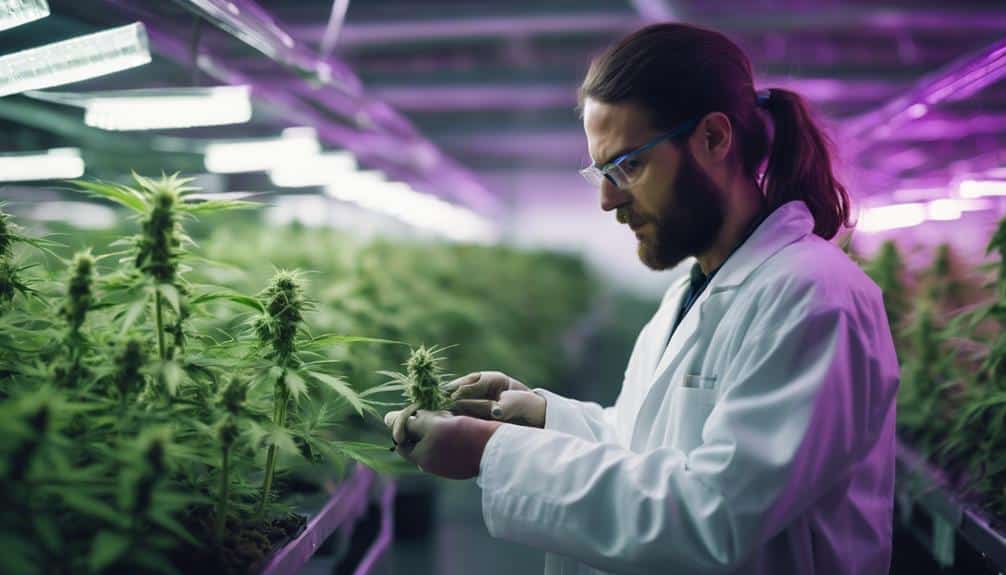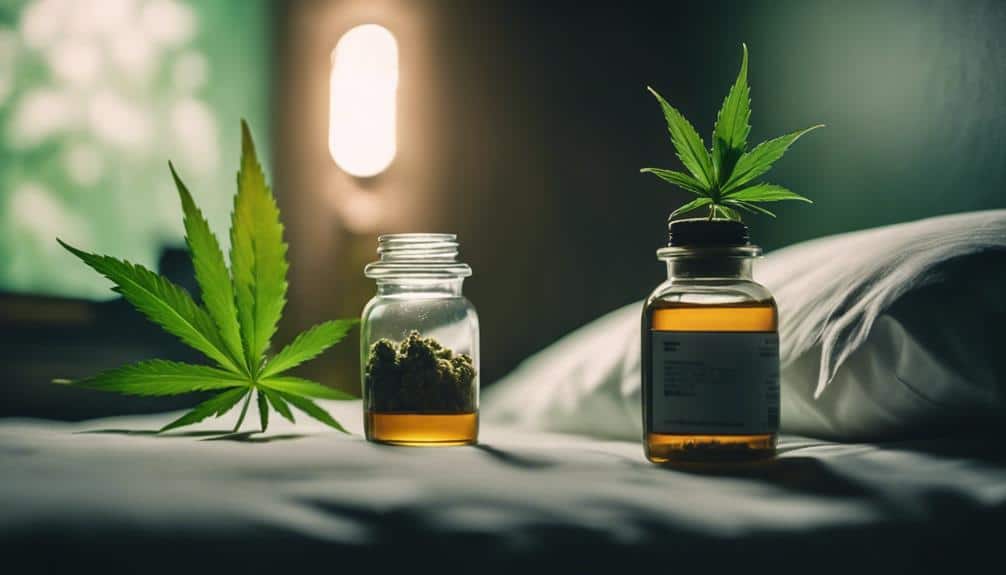Imagine the relief you’d feel if a single plant could address your specific health condition more effectively than ever before. Advances in medical marijuana strains have made this a reality, offering targeted relief for chronic pain, epilepsy, anxiety, PTSD, insomnia, cancer symptoms, and multiple sclerosis. By harnessing the unique properties of cannabinoids and terpenes, these specialized strains provide personalized treatment with minimal side effects. You might be wondering how these breakthroughs can specifically benefit you or someone you care about. Let’s explore how these advancements are reshaping the future of medical treatments.
Chronic Pain Relief

Have you ever wondered how specific marijuana strains can effectively alleviate chronic pain? The answer lies in understanding the complex interplay between terpene profiles and CBD ratios.
Terpenes are aromatic compounds found in cannabis that play a significant role in its therapeutic effects. For instance, strains high in myrcene such as OG Kush exhibit potent analgesic properties that can help reduce pain perception.
CBD (cannabidiol) is another essential component. Unlike THC (tetrahydrocannabinol), CBD doesn’t produce a high making it particularly appealing for medical use. Strains with higher CBD ratios like ACDC or Charlotte’s Web are often recommended for chronic pain relief as they modulate the body’s endocannabinoid system reducing inflammation and providing a more balanced analgesic effect.
The combination of specific terpene profiles with ideal CBD ratios can target various types of chronic pain more effectively. For example, strains with both high CBD and a-pinene content can offer anti-inflammatory and pain-relieving benefits without sedative effects.
Managing Epilepsy
Managing epilepsy with medical marijuana requires a detailed understanding of cannabinoid profiles and their neurological effects. High-CBD strains have shown significant promise in seizure control, largely due to cannabidiol’s (CBD) anticonvulsant properties. Unlike THC, CBD doesn’t produce psychoactive effects making it a safer option for managing epilepsy especially in pediatric cases.
You’ll want to consider strains like Charlotte’s Web which are renowned for their high CBD content and minimal THC. Clinical trials and anecdotal evidence indicate that these strains can reduce seizure frequency and severity. For instance, a study published in The New England Journal of Medicine highlighted that CBD notably decreased seizure activity in patients with Dravet syndrome, a severe form of epilepsy.
When recommending medical marijuana for epilepsy you must also be mindful of the exact cannabinoid ratios. Tailoring the CBD-to-THC ratio to the patient’s specific needs is essential for optimizing treatment outcomes. Monitoring and adjusting dosages are equally important as individual responses can vary.
Incorporating these evidence-based insights into your practice can enhance the quality of life for epilepsy patients offering them a viable alternative when conventional treatments fall short. Your dedication to understanding and applying these advancements ensures better seizure control and overall patient well-being.
Alleviating Anxiety

Alleviating anxiety with medical marijuana involves selecting strains with specific cannabinoid and terpene profiles that have been shown to modulate stress and anxiety responses effectively. Strain selection is vital; strains high in cannabidiol (CBD) and low in tetrahydrocannabinol (THC) often provide the best results. CBD has anxiolytic properties without the psychoactive effects associated with THC. Terpenes like linalool and limonene further enhance calming effects as supported by multiple studies examining their impact on the central nervous system.
When it comes to dosage recommendations, starting with a low dose and gradually increasing it is generally recommended. Microdosing, which involves taking minimal doses, can help you find the best balance without overmedicating. For instance, a common starting dose might be 5-10 mg of CBD, with adjustments made based on the individual’s response.
Monitoring the patient’s anxiety levels and any side effects is crucial for tailoring the treatment effectively.
PTSD Treatments
Treating PTSD with medical marijuana involves selecting strains rich in cannabinoids like CBD and THC that have shown potential in reducing symptoms such as hyperarousal, nightmares, and flashbacks. The effectiveness of these treatments hinges on the cannabinoid profiles of the selected strains. Research indicates that CBD’s anxiolytic properties can mitigate severe anxiety and hyperarousal while THC may help reduce nightmares and intrusive thoughts by modulating the endocannabinoid system.
You’ll want to focus on strains with a balanced ratio of CBD to THC. High-CBD strains like ACDC or Cannatonic are noted for their neuroprotective effects which can help stabilize mood and reduce the frequency of traumatic flashbacks. On the other hand, strains with moderate THC levels such as Blue Dream or OG Kush offer the psychoactive benefits necessary to alleviate sleep disturbances and emotional dysregulation without overwhelming the patient.
It’s essential to tailor the cannabinoid profiles to the individual’s specific symptoms and response to treatment. By understanding the neuroprotective effects and therapeutic potential of different cannabis strains you can better assist those suffering from PTSD providing them with a personalized approach to symptom management.
Insomnia Solutions

When considering medical marijuana for insomnia it’s vital to select strains with specific cannabinoid and terpene profiles that promote relaxation and improve sleep quality. Indica-dominant strains are often recommended due to their sedative effects. These strains generally contain higher levels of myrcene, a terpene known for its muscle-relaxant properties, and linalool which can reduce anxiety and stress.
Analyzing the cannabinoid content you’ll find that a balanced ratio of THC and CBD can be particularly effective. THC induces the initial onset of sleep while CBD helps maintain it through its anxiolytic properties. Strains like Granddaddy Purple and Northern Lights are well-regarded for their consistent results in treating insomnia.
You should also consider the entourage effect where cannabinoids and terpenes work synergistically to enhance therapeutic outcomes. For instance, terpenes such as caryophyllene and limonene can further amplify the sedative and anxiolytic effects when combined with specific cannabinoids.
It’s imperative to individualize treatment based on patient response and tolerance. By understanding these technical aspects you can make informed decisions to better serve those struggling with insomnia ensuring they achieve restful and restorative sleep.
Cancer Symptom Relief
Many cancer patients turn to medical marijuana to mitigate symptoms like pain, nausea, and loss of appetite supported by its diverse cannabinoid and terpene profiles. Research indicates that specific strains high in THC and CBD can greatly aid in nausea reduction and appetite stimulation.
For instance, strains like ‘Chemo’ and ‘Northern Lights’ are particularly effective due to their balanced THC:CBD ratios and terpene content which enhance their antiemetic and appetite-inducing properties.
From an analytical perspective, the entourage effect—where cannabinoids and terpenes work synergistically—plays an essential role in symptom relief. High-THC strains such as ‘Blue Dream’ offer substantial pain relief while CBD-rich strains like ‘Harlequin’ provide anti-inflammatory benefits without strong psychoactive effects.
When selecting a strain you should consider the individual patient’s symptom profile and tolerance levels.
Evidence-based studies support the efficacy of these strains in improving quality of life for cancer patients. By focusing on strains with specific cannabinoid and terpene profiles you can tailor treatment plans that maximize nausea reduction and appetite stimulation. This targeted approach not only alleviates physical discomfort but also enhances overall well-being.
Addressing Multiple Sclerosis

Effective management of Multiple Sclerosis (MS) symptoms can leverage specific medical marijuana strains known for their neuroprotective and anti-inflammatory properties. Research indicates that cannabinoids like THC and CBD can greatly alleviate muscle spasticity, a common and debilitating symptom of MS.
When you aim to support a patient with MS selecting strains with balanced THC and CBD ratios is essential. These cannabinoids work synergistically to reduce inflammation and provide neuroprotection benefits potentially slowing disease progression.
Consider these compelling reasons for integrating medical marijuana into MS treatment plans:
- Improved Mobility: Patients often experience reduced muscle spasticity leading to enhanced mobility and independence.
- Pain Relief: Strains high in CBD can offer substantial pain relief without the psychoactive effects of THC.
- Mood Stabilization: Balanced strains can help manage anxiety and depression common comorbidities in MS.
- Better Sleep: Effective symptom relief often leads to improved sleep quality further enhancing overall well-being.
Conclusion
You’ve seen how advances in medical marijuana strains are like a master key revealing tailored treatments for chronic pain, epilepsy, anxiety, PTSD, insomnia, cancer symptoms, and multiple sclerosis.
By understanding the intricate dance of cannabinoids and terpenes you’ll benefit from targeted relief and fewer side effects. These breakthroughs guarantee you’re not just managing symptoms but enhancing your overall well-being with precision and care.
This personalized approach symbolizes a significant leap in the evolution of medical treatment.
If you’re curious to learn more or have any questions I warmly invite you to visit Fells Point Cannabis Docs of Maryland or give us a call at (410) 401-4200. We’re here to help guide you on your journey to better health with expert advice and compassionate care.
Don’t hesitate to reach out; let’s explore the best options for your unique needs together!

